Issue No. 60/November 2021
BY: RIZZA JOY D. BARRAS, AO V
Inclusive recovery is everyone’s business.
This time of pandemic, we are all challenged to become more resilient in the process of regaining what has been lost and be more strategic to recover from the crisis. The Regional Dagyaw Open Government Virtual Town Hall Meeting was made possible through the collective efforts of the Department of the Interior and Local Government, Department of Budget and Management, and the Philippine Information Agency. Said event, which carries the theme, “Improving Social Accountability in Local Service Delivery,” aims to provide an avenue for an open dialogue between the government and the Filipino people from different sectors to discuss various national and local issues concerning our society.
This year’s Regional Dagyaw episode, “Usapang Ekonomiya: Ekonomiya Sa Rehiyon Otso sa Panahon ng Pandemya,” focused on the economic status of the Region, the government’s strategies and recovery efforts, as well as on the assistance programs and government interventions to address the pandemic and the economic challenges that hinder the progress of the region.
The Dagyaw was held on November 5, 2021 via the Zoom platform and was simultaneously streamed live on Facebook and YouTube. Various national government agencies, local government units (LGUs), State Universities and Colleges, private sector, civil society organizations (CSOs), non-government organizations and the public participated in the event. It is the third consecutive year of the Dagyaw Town Hall Meetings and the second leg of the Regional Dagyaw in Eastern Visayas.
The term “Dagyaw” is a Hiligaynon word which means “bayanihan” or “togetherness.” And true to its name, the Virtual Town Hall Meeting brings people together. In his welcome message, DILG Regional Director (RD) Arnaldo E. Escober, Jr. ensured that, amid the pandemic, the Open Government Virtual Town Hall Meeting would bring people together and consequently bring the government closer to the people. He commended the government for the continued implementation of programs and strategies to overcome the effects of this crisis. Through the Dagyaw, the people are made aware of these economic programs, as well as other national and local recovery programs.
Help from the Government Ms. Geselle Francez P. Zeta, from the National Economic and Development Authority (NEDA) RO VIII, presented the government’s plan and economic situation in the Region. She shared the Economic Outlook for 2021, particularly the shapes of recovery in employment, agribusiness, tourism, among others, that were greatly affected by the pandemic.
Ms. Zeta also highlighted the economic recovery through The Presyo, Trabaho, Kita (PiTiK) Test, which follows three glances or indicators. The test focuses on inclusive recovery, particularly in agribusiness and digital commerce. At the end of her presentation, she encouraged everyone to help in the country’s recovery. “Inclusive recovery is everyone’s business. Let us do our part.”
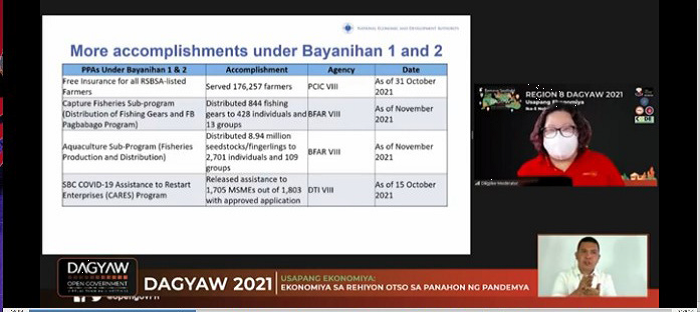
Open Virtual Dialogue with Various Sectors
The Dagyaw served as a platform for the Private Sector Representatives (PSRs) to share their concerns, comments and feedback, as well as proposals to aid the government on its economic recovery efforts. Various sectors have introduced their initiatives and recovery programs to overcome the economic crisis.
Labor’s Participation
“A healthy workforce equals a healthy economy,” Atty. Miguel T. Tezon, representative from the labor sector pointed out in his discussion. He emphasized the good effect of the vaccination program to the labor workforce, “We cannot achieve a continuing growth unless people understand what is this virus and the process of its transmission. We have to make people believe that the only way to prevent it is by observing protocols and that vaccination prolongs life and not shortens it.”
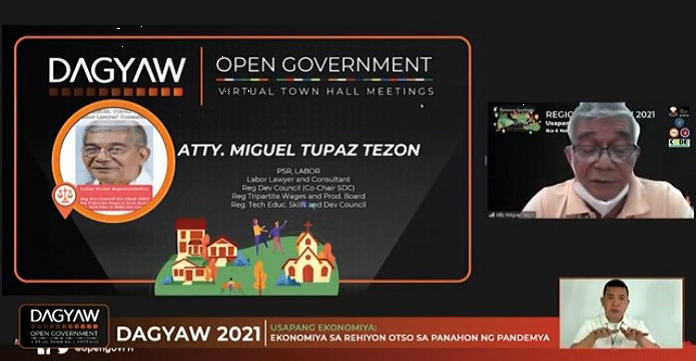
Tourism’s Intervention
Representing tourism sector, Mr. Reynaldo A. Franco shared the contribution of the tourism in the Region’s Gross Regional Development Product. However, during the pandemic, tourism is one of the greatly affected sectors that needs assistance. Thus, he proposed to have a more strategic approach on how the Region can reboot tourism starting 2022.

Civil Society Organization’s Initiatives
Ms. Donabelle L. Abalo shared the CSO’s initiative in helping address the crisis through
the Community Managed Savings Program. The program was strategized to prevent or reduce gender-based violence and economic exclusion, as well as to provide financial access. The CSO also provides other support such as capacity development and mentoring and coaching.
Ms. Abalo concluded that CSOs’ involvement in governance is crucial and that their top priority is to have equal access to opportunities in the government.
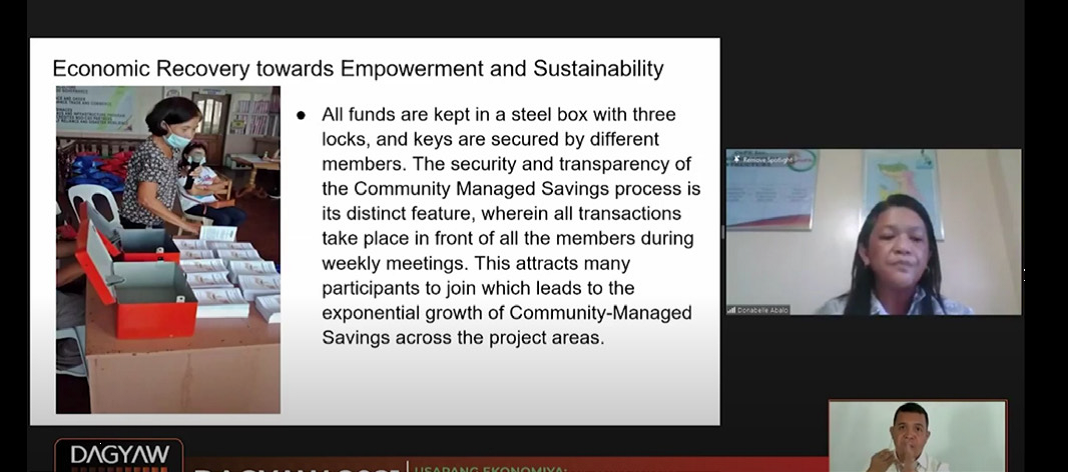
Helping Hands
From the academe’s perspective, Mr. Gerwyn P. Enerlan shared the Eastern Visayas Recovery through a macroeconomic lens in relation to the possible growth path. He presented, based on data from the Philippine Statistics Authority and NEDA, the factors that affect our economic growth. He said our economy is becoming more service-oriented, with the hard industries such as agriculture contributing less to the gross regional development product. To avoid or minimize such economic scenario, he laid down some economic strategies such as encouraging small and medium enterprises to produce products that have high value-added and high export value.
Mr. Enerlan further highlighted some of the keys to economic recovery. These include the vaccination efforts of the government and taking advantage of the Supreme Court Ruling on the Mandanas-Garcia petitions, as well as giving greater responsibility to the LGUs on the use of funds to stir economic growth.
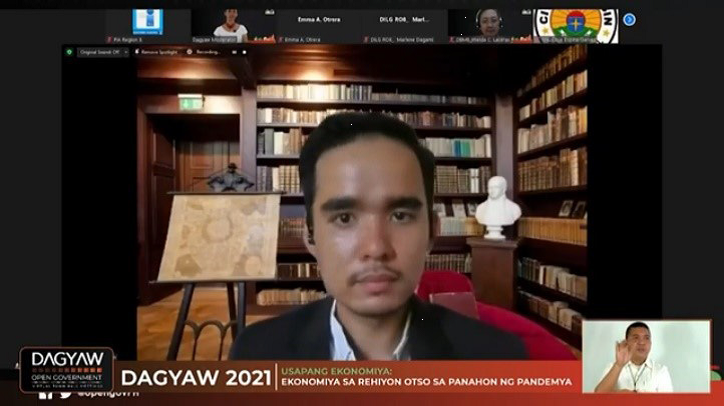
Local Government Unit’s Part
Honorable Mayor Nacional V. Mercado of Maasin City shared the initiatives and programs of the LGU to combat COVID-19 and move the economy forward. In responding to the crisis, the LGU has ensured that its responses are inclusive and proactive to ensure the health and welfare of its constituents. Aside from providing financial assistance to displaced persons, they also sought the assistance of the private sector in providing COVID-19 quarantine facilities. Mayor Mercado also shared that the vaccination program rate of the LGU is now at 49 percent.
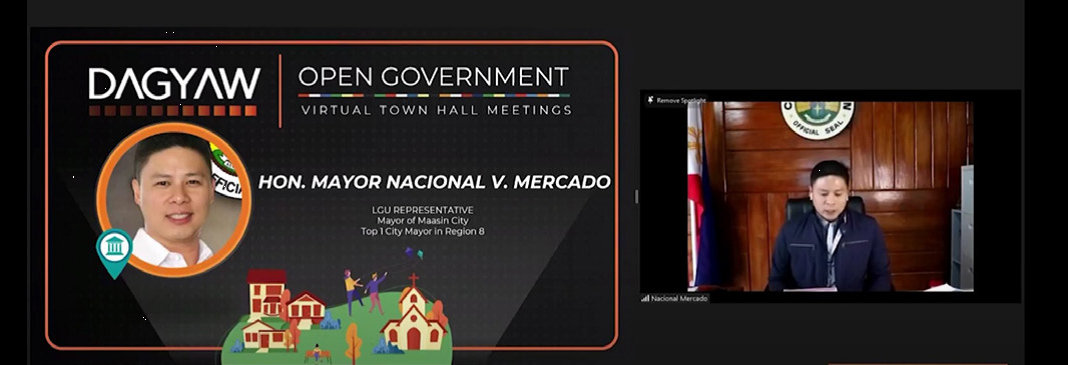
Bayanihan through Dagyaw
RD Imelda C. Laceras, in her closing remarks, stressed that talking collaboratively and seeking the help of all stakeholders is the crux of the dialogue for it will complete and push the wheel to full economic recovery of the Region.
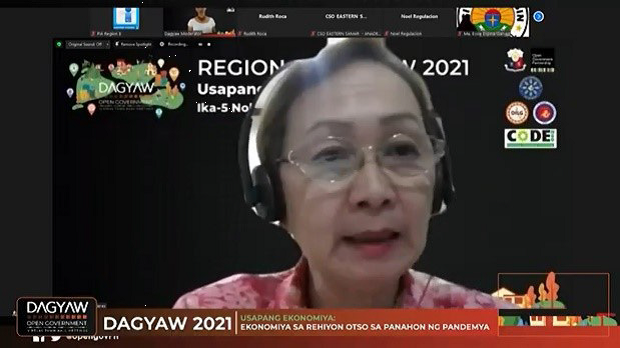
“2021 is a critical year since this is when we prepare the path to the transition to full devolution. Recovery is not a sole responsibility of the government, rather a concern of everyone. Faced with uncertainties, the more that we need to conduct dialogues such as this, the more that we need to purposely connect with each other to bring about more meaningful discussions, results, and positive impact on the lives of the people in Eastern Visayas.” In closing, RD Laceras encouraged everyone to be part of this journey.

